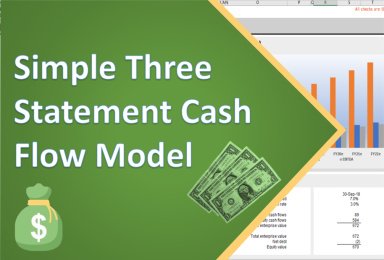
Last version published: 02/01/2019 16:45
Publication number: ELQ-73079-6
View all versions & Certificate

Simple three statement Excel cash flow model
Simple three statement (cash flow, Balance Sheet and Income statement) forecasting model & valuation
Further information
To generate a simple forecast set of financial statements for a business and produce a valuation. The model also has the ability to enter historic balances if there are any
The user has some basic understanding of discounted cash flow valuations
The user has enough understanding of the business to enter sales, costs, working capital, and capex assumptions
The user has a basic understanding of accounting
The user requires flexibility in the tax calculations to correctly reflect their own tax jurisdiction
If the user requires more than one type of depreciation rate for assets
When the user wishes to model intangibles or the Investments balance in a flexible way (ie not held constant)
If the user requires more than one type of working capital assumptions for each of debtors, creditors and stock





